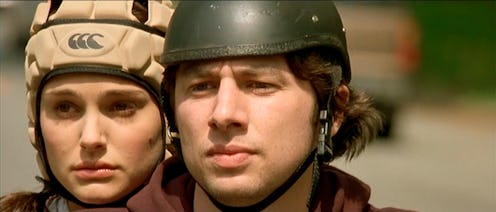Entertainment
Why 'Garden State' Was the Classic '00s Movie

Break out your helmets, because Garden State turns 10 today. We're still wondering if Zach Braff figured himself out, and from the reviews of Wish I Was Here, we know that he probably hasn't. Largeman will forever be one of my favorite boring characters, but his angsty presence bothers me upon rewatching Garden State. And although I never really related to Natalie Portman's Sam, her revision of the indie dreamgirl (formerly known as Manic Pixie Dream Girl) was important for future indie romances. Nonetheless, many of the quotes from Garden State formed a sort of early millennial credo, which could only be told through the mouths of confused, depressed, grief-riddled 20-somethings.
Although the film has these universally millennial moments, it is also deeply mired in the culture of the early 2000s. Since it was released in 2004, the '00s had settled into a rhythm of music, art, and ideas that are uniquely turn-of-the-millennium. The idea of "indie" was just taking off at the time, and J.D./Zach Braff captured a moment of our cultural history in his angsty account of suburban New Jersey. It may be difficult to rewatch, but it captures the '00s like Can't Hardly Wait portrays the '90s: honestly, brutally, and with more than a little irony.
The Music
We all know that the soundtrack for Garden State is kind of wonderful, and the music perfectly captures the early 2000s indie hits. Zach Braff hand-picked all of the songs From the meet-cute where Sam shows Largeman The Shins,
The Metered Optimism
Garden State was one of the first tastes of millennial disillusionment, but because it was made in 2004, there was also a sort of optimism at the end. If the movie was remade post-2009 crash, I can imagine that the mood at the end of the film would go from ambiguously optimistic to ambiguously depressed. Look at Lena Dunham's Tiny Furniture for a great example of this tonal shift.
The Clothes
Since Garden State is a film about middle-class and upper middle-class New Jersey in the early '00s, and the clothes are generally spot-on. Natalie Portman sells the flared jeans-and-a-sweater combo with gusto, and Zach Braff's henleys and jeans generally look pitch-perfect for the era. Occasionally the fashion is used as a plot device, as with Largeman's wallpaper camouflage or the gang's impromptu trash bag ponchos, which makes it even better suited to the film. So if you need a primer and average-Joe '00s looks, Garden State isn't a terrible place to start.
The Mental Health Issues
With an almost 400% boom in antidepressant medication use in the early '00s, Americans were concerned about their use, abuse, and long-term side effects. Although Largeman's heavily regulated antidepressant dose is only one aspect of the film, it was clearly well-suited to a time that also brought films like Prozac Nation , as well as the first longitudinal studies on antidepressant use. Even though antidepressants have died down slightly as a hot-button issue, the film's unabashed look at mental health is one of the things that carries well from the '00s to its 10th anniversary.
Image: Camelot Pictures